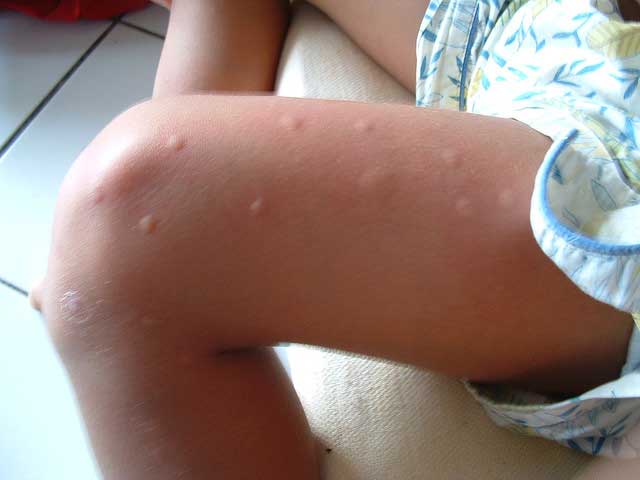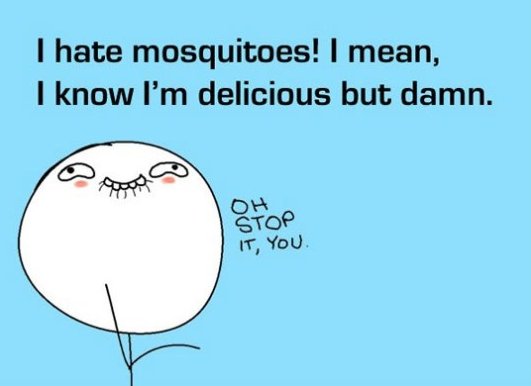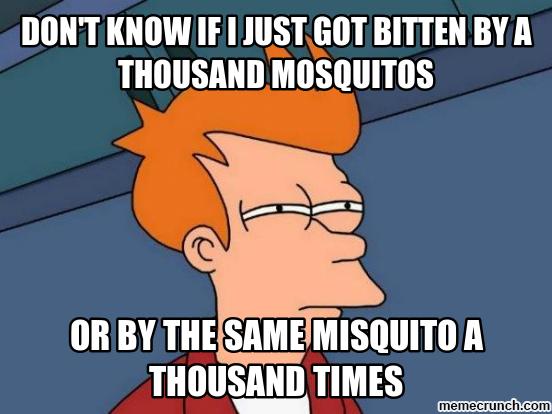If you have ever been to tropical areas you’ll probably have used DEET. Especially in those regions of the world where malaria is a threat, an effective mosquito repellent is a must. And now that the West Nile virus has made its entrance in the US it may be a required for domestic use too.
Anyone who has sprayed their skin with the chemical repellent and then picked up a nylon jacket or plastic shades may have seen the item fall apart in their hands.
DEET can damage all kinds of synthetic items, from flipflops to water bottles. It may take of your nail polish or disintegrate your tights.
Which begs the question, what about the health concerns regarding the substance itself? Is it really safe to use?
What exactly is DEET?
It’s the most common synthetic insect repellent. Chemically known as N,N-diethyl-m-toluamide; also called N,N-diethyl-3-methylbenzamide. Because of these scientific names it is better known by its acronym, DEET.
DEET was developed for use by the U.S. Army during World War II in 1946 and has been registered as a pesticide since 1957 when it became available to the consumer market.
Why is DEET often recommended?
Natural alternatives such as plant extract-based substances exist. These include citronella oil and p-menthane-3,8- diol (PMD). While it is true that these compounds are also good at repelling insects there is a downside.
Most plant-based repellents are made up of volatile constituents which makes them not effective over long periods of time. In other words, for you to stay protected you have to keep on applying these repellents.
DEET is the most effective repellent because, contrary to other (natural) insect repellents the synthetic compound DEET works for hours on end. Simply put, DEET is the best bug repellent and only really effective substance we’ve got.
For this reason it is the most widely used repellent and as PubMed states,
generally considered to be the “gold standard” repellent, providing long-lasting protection of up to 8 hours from time of application [2].
Does DEET work on mosquitos only?
DEET is known to repel a wide range of insects including mosquitoes, flies, ticks, fleas, chiggers, no-see-ums, midges and gnats.
DEET products
World’s most well known mosquito repellent comes in various forms such as sprays, lotions, liquids, and impregnated materials such as wrist bands, nets, towelettes and roll on devices. Products used for direct application to the skin contain from 4% to 100% Deet. Most formulas however, contain between 10% and 30%.
As of 2005, 30 different manufacturers offered over 100 products for sale that contained DEET.
The U.S. Environmental Protection Agency (USEPA) estimated that in 1990 about 30 percent of Americans used DEET every year. The estimated use in 2000 was between 5 and 7 million pounds (J Pesticide Reform, 2005, Fall).
How does Deet work?
Instead of killing mosquitos Deet works by making it hard for the bugs to smell you. DEET is one of the few registered pesticides that is applied directly to the skin and clothing.
The way DEET works is to prevent special receptors in the insects’ antennae from functioning normally so they cannot detect the presence of the host they are seeking to bite (J Pesticide Reform, 2005, Fall).
According to Consumer Reports tests, “the top six repellents protected against deer ticks and mosquitoes for seven hours or more.”
How long does DEET work?
It depends on the concentration. The higher the percentage of DEET present in the product, the longer it works.
Generally products with 10 percent DEET are effective for about two hours. It is said that a DEET concentration of approximately 24 percent provides five hours of protection on average.
However, if you are going to tropical locations it is recommended to use spray containing at least 20% DEET. Even a repellent with a 15% concentration is claimed to put you at risk of malaria and Dengue fever.
WebMD mentions:
Repellents with 23.8% DEET protect wearers for about five hours, according to a study led by Mark Fradin, PhD, a researcher with Chapel Hill Dermatology.
Senior lecturer in medical entomology at the London School of Hygiene & Tropical Medicine, Dr James Logan stresses that low level DEET products are not very effective. He urges to use repellents containing 20-50 % DEET in tropical areas.
Don’t believe the scaremongers
If you have to believe the scary tales of people like Dr. Mercola you will think twice before putting Deet on your skin.
A wide range of websites warn for the dangers of Deet mosquito repellent. Some tell you that the substance is so harsh, it kills mosquitoes which is false.
Others make claims such as:
“DEET pumps through your nervous system and has been proven to kill brain cells”
Recent research demonstrates that all Deet does, especially upon reading such information, is make people nervous as this article by the Los Angeles Times demonstrates, DEET repels bugs, worries consumers. It however, does not affect our nervous system.
Is DEET really safe?
According to some sources traditional insect repellents such as DEET can be hazardous. This conclusion is commonly based on the following assumptions and findings.
- DEET has been tested on laboratory animals and on human cells and has been shown to cause damage to DNA. “The results indicate that dermal administration of DEET could generate free radical species hence cause DNA oxidative damage in rats.” (PubMed)
- Some governments limit DEET concentration after reports of DEET use causing a type of brain disease called encephalopathy. To put this in perspective, since 1957 and the hundreds of millions of applications of the substance to the skin since that time there were only 14 cases of encephalopathy associated with DEET. Which, in relative terms, is an extremely small number. Also, experts point out that “it is difficult to point to DEET as the culprit.”
- The two pregnant women who gave birth to babies with problems were known to use “large amounts of DEET”.
- DEET was shown to cross the placenta in pregnant laboratory animals and exposure to DEET in amounts equivalent to what is typically applied to human skin was shown to affect their behavior and nervous systems, reducing sensory and motor skills.
- There’s one human trial on the safety of DEET, conducted on pregnant women in Thailand. It showed evidence of traces of DEET in the children, suggesting that the substance could cross the placental barrier there were however no differences in the health of the babies between the DEET treatment group and the control group babies.
- This study demonstrated that researchers, following women in Thailand who used DEET from their second trimester of pregnancy onward DEET reduced the incidences of malaria. Also, babies born to moms who used DEET didn’t suffer from birth defects or even differ from babies born to moms who didn’t use DEET.
- DEET has been shown to cause synergism when mixed with certain other pesticides like permethrin and Malathion.
- DEET has also been suspected of being an environmental contaminant and might be harmful to the developing chicks of birds (J Pesticide Reform, 2005, Fall).
Despite the horror stories, DEET is generally considered safe
The aforementioned PubMed study also mentions “some rare reports of severe reactions in people”.
It also refers to DEET causing plastic to melt and damaging mobile phones and glasses. Other common disadvantages of DEET are the unpleasant odor and skin sensation after application.
In conclusion, although these proclaimed health risks sound scary and serious in reality they are not that realistic. Often such warnings are taken out of context.
Joe Conlon, PhD, technical advisor to the American Mosquito Control Association says that DEET,
has been in use for over 40 years and has a remarkable safety record. Only few hospitalizations have been reported, mainly due to gross overuse.
Meta study concludes DEET is safe
Dr Logan, leading a review of existing studies concluded that
There is insufficient evidence to show that DEET is unsafe for human use. If DEET caused serious health problems, we would know about it by now.
According to the researchers, “the benefits of avoiding disease-spreading insect bites outweigh any risks associated with applying DEET to the skin.”
EPA on DEET
According to the Environmental Protection Agency the substance is safe when used according directions.
EPA continues to believe that the normal use of DEET does not present a health concern to the general population, including children.
What do other sources say?
- The renowned health website WebMD also refers to EPA and adds that DEET has caused rare toxic reactions when not used as instructed.
- Most sources agree that DEET shouldn’t be applied to babies less than 2 months old.
- The American Academy of Pediatrics has advised against using repellents with DEET concentrations higher than 30% on any kids.
- Consumer Reports Health advice against using a repellent with more than 30% DEET.
Does Deet have no risks or side effects at all?
As with all substances, even the mildest, skin irritation may occur. We are all different. Obviously, accidents can happen. Breathing in or swallowing the bug spray can cause bug spray poisoning.
Wrapping it up
Most experts agree that the benefits of using DEET outweigh the (potential) downsides. Sure it doesn’t smell like roses and it may feel unpleasant on your skin.
But by avoiding its use or using too little you are likely to put yourself in harmful situations.
Also make sure to use a repellent with an appropriate concentration to guarantee its efficacy.
Scientists are working on natural alternatives that are just as effective. Until that time, keep spraying and remember, if not just truly annoying, mosquitoes are the world’s most deadly animals.
Read this to learn more about proven effective ways to make your yard less attractive to mosquitoes.
.


